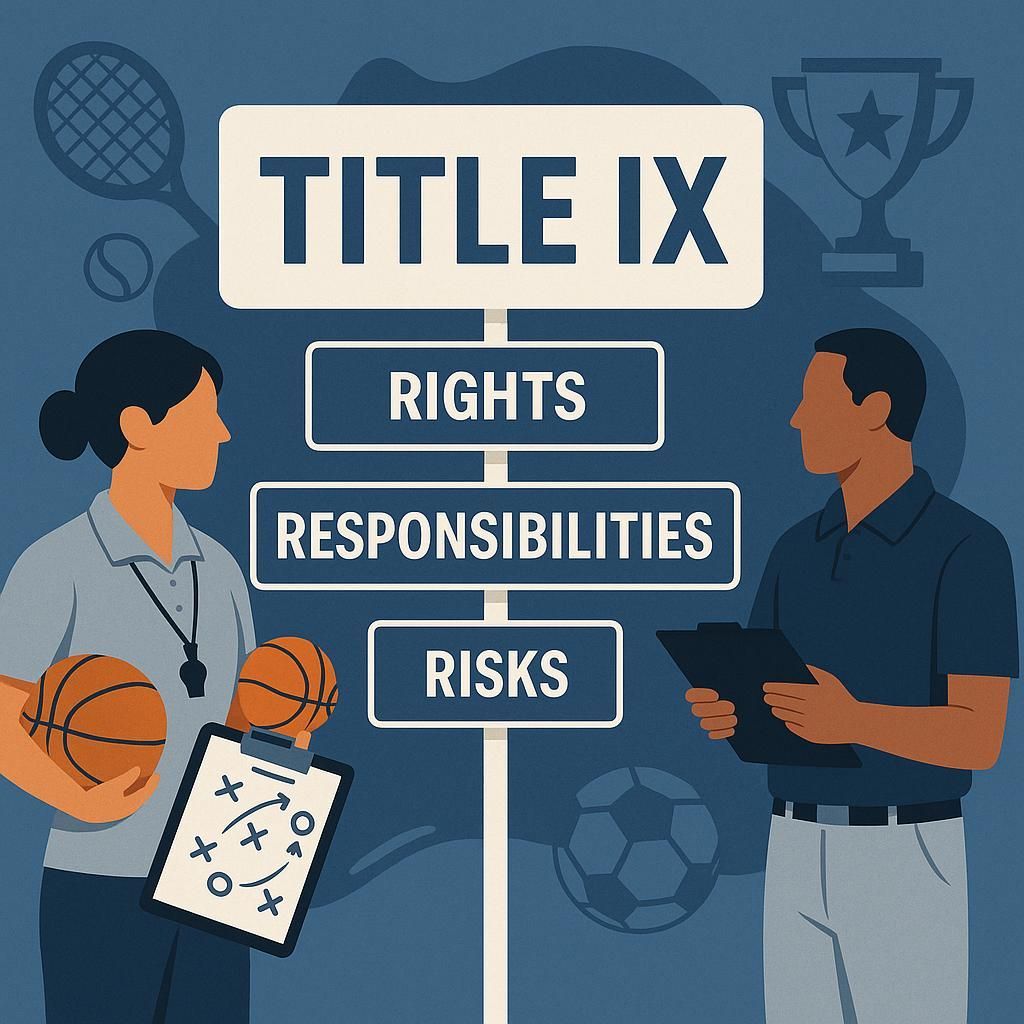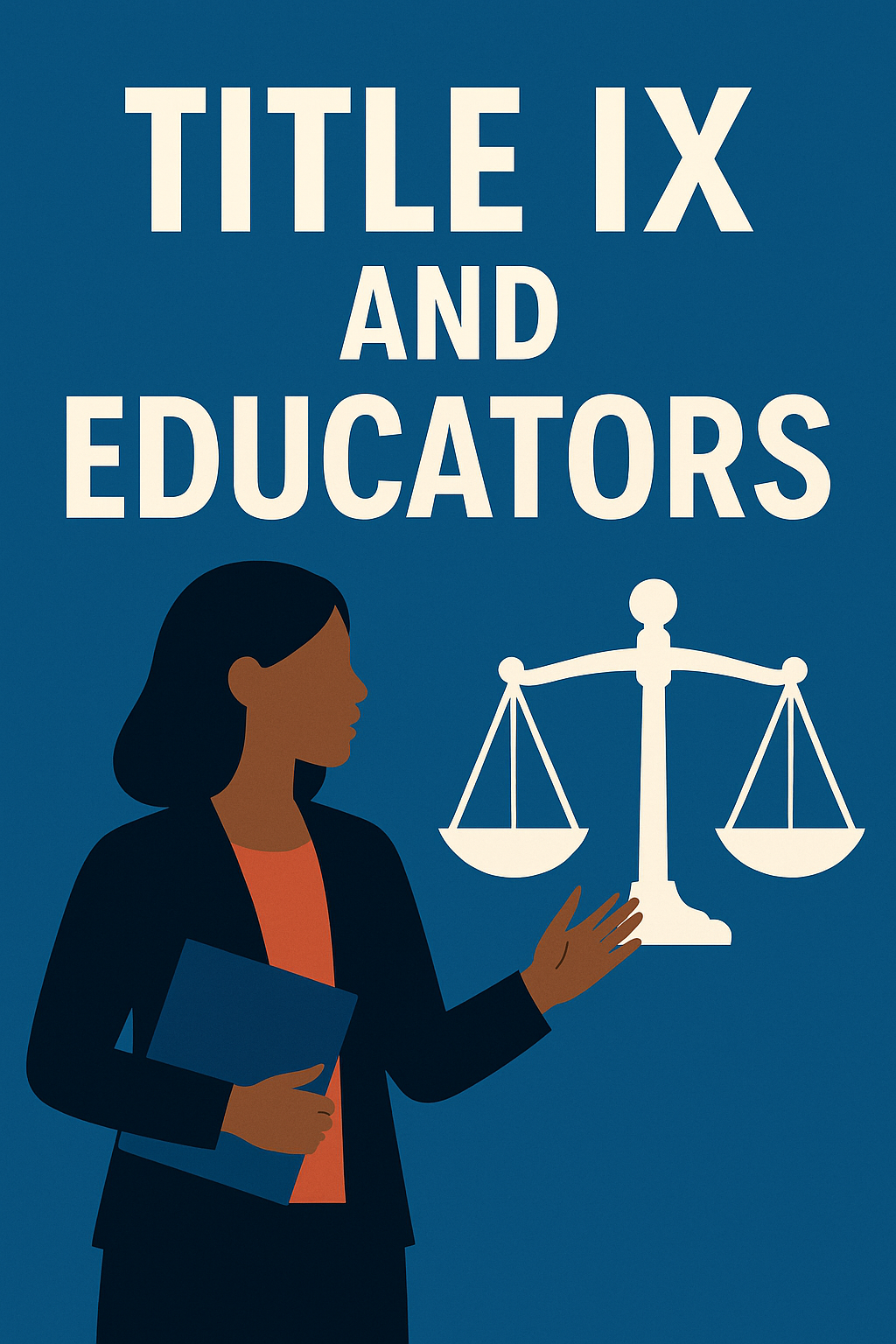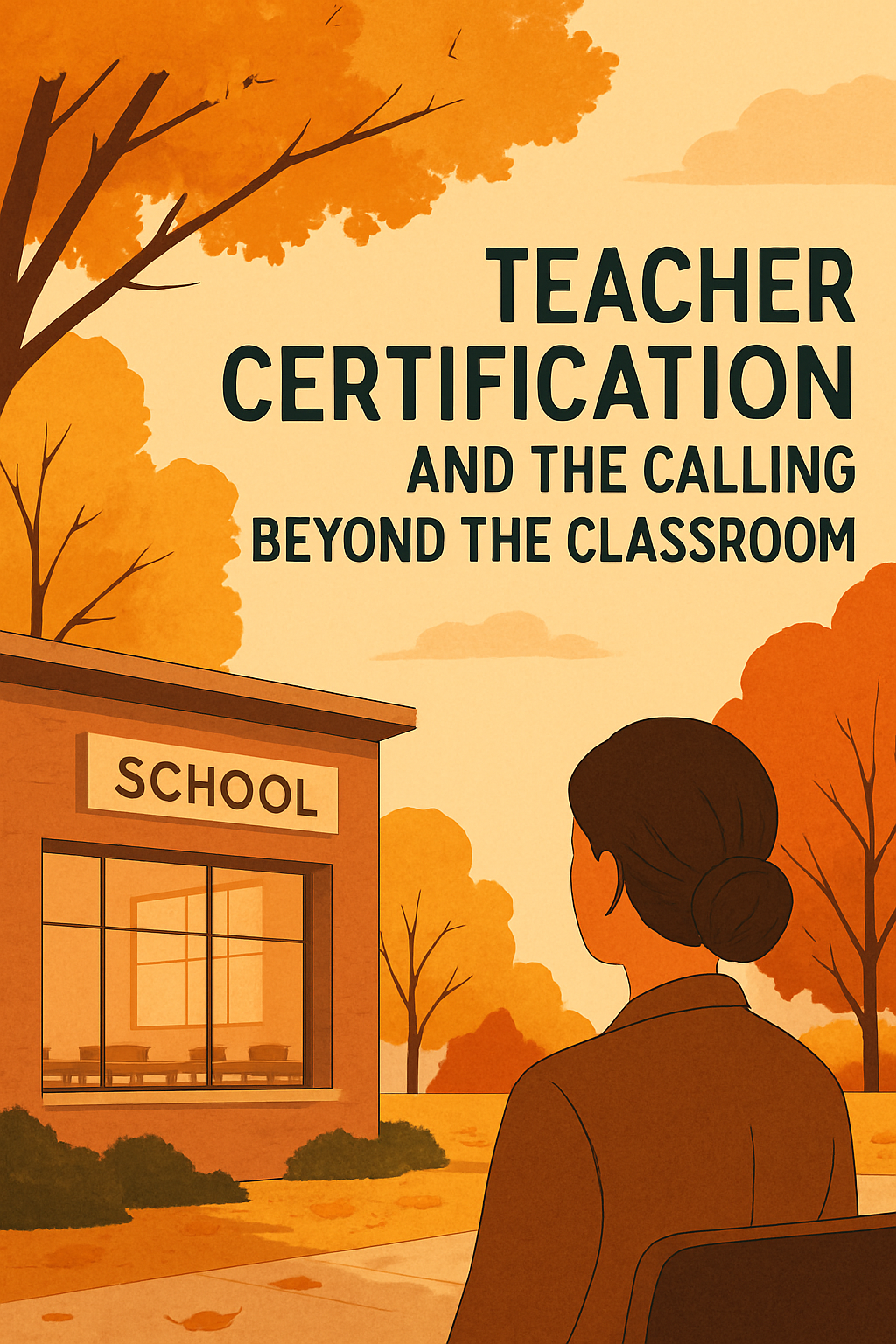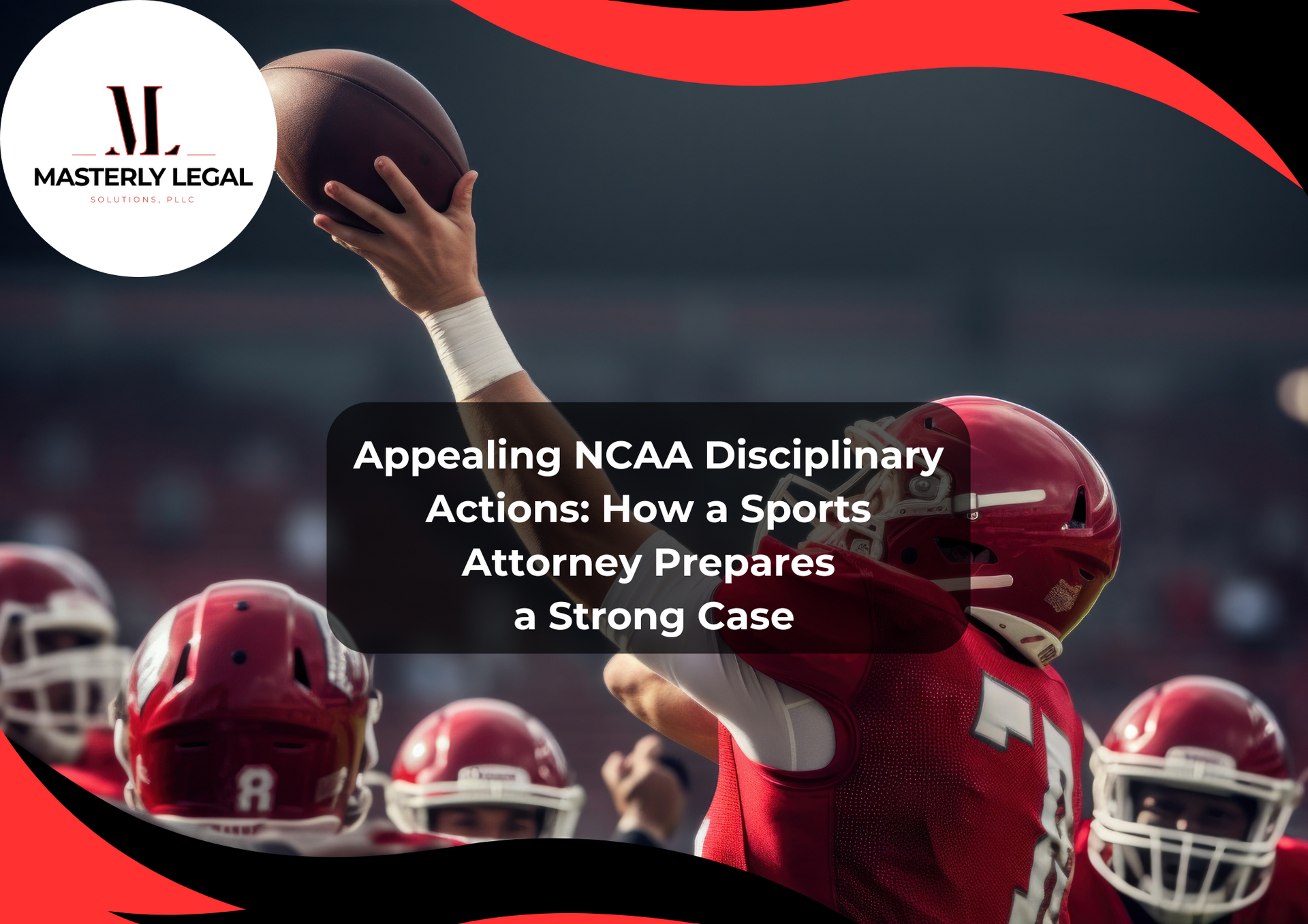What Educators and Coaches Need to Know About Title IX in Education
Title IX is a critical piece of legislation that shapes how educators and coaches manage sports programs and ensure equal opportunities for all students. While the law was created to prevent sex-based discrimination in educational settings, it has particularly had a major impact on athletics. For sports programs, Title IX mandates that students—both male and female—must be given equal access to athletic opportunities, resources, and support. This is a significant responsibility for coaches, who must ensure that they adhere to Title IX regulations to avoid potential legal issues that could damage their career.
Coaches, Are You Title IX Aware?
Even unintentional actions—like favoring one team, making a comment, or providing uneven resources—can lead to serious Title IX violations.
Equal treatment.
No discrimination.
Report concerns.
One careless moment can cost your career. Know your rights and your responsibilities.
Title IX in Education for Sports: What Educators and Coaches Need to Know
Title IX of the Education Amendments of 1972 applies to all education programs or activities receiving federal financial assistance, including sports. Educators and coaches play a key role in maintaining Title IX compliance by ensuring that no student is subjected to discrimination based on sex. However, the law goes beyond just equality in athletic participation; it also protects students from sexual harassment and ensures a safe, non-discriminatory environment.
For coaches, this means there are multiple layers of responsibility. From ensuring equitable resources, practice time, and scholarships for female athletes to creating a respectful and harassment-free environment, Title IX applies in many ways to the sports sector.
Risks and Responsibilities: Ensuring Equal Opportunities for All Athletes
Under Title IX, male and female athletes must receive equal treatment in several areas of athletic programs, including:
- Opportunities to Participate: Both male and female students must be given equal chances to participate in sports programs, with no discrimination based on sex. If there is a discrepancy between male and female athletes in terms of the number of available teams, training sessions, or games, coaches may be violating Title IX.
- Example Scenario: A coach decides to cut a female athlete from the team because they believe the team already has enough players and the male team could benefit from additional members. However, this decision could be seen as discriminatory if there were not enough opportunities offered to female athletes in the first place. Title IX requires that teams and rosters reflect equal opportunity regardless of gender.
- Equal Equipment and Facilities: Coaches must ensure that male and female athletes have access to similar quality facilities, equipment, and coaching staff. This includes the provision of uniforms, practice fields, locker rooms, and other essential athletic resources.
- Example Scenario: A coach may unintentionally provide the men's team with new, high-quality uniforms while the women’s team continues to use outdated gear. Though the coach may not have intended to discriminate, such a discrepancy could be viewed as a violation of Title IX.
- Coaching and Staff Support: Title IX mandates that male and female athletes have equal access to coaching staff, medical services, and athletic trainers. If a coach only provides a personal trainer to male athletes but not to female athletes, this could be a violation of the law.
- Example Scenario: A coach is coaching a girls’ soccer team and does not allocate sufficient time with a personal trainer for the team. However, the boys’ soccer team receives more time with the trainer. Even if this difference is unintentional, it may result in Title IX violations.
What to Avoid: Simple Actions That Could Risk a Career
Coaches and educators must understand that Title IX violations can arise from even seemingly innocent comments or actions. Here are several examples where actions or words may put a coach’s career at risk:
Sexual Harassment: Title IX prohibits sexual harassment in all aspects of education, including sports. This extends to coaches’ behavior toward their athletes, colleagues, and anyone involved in the athletic program. Even a comment or gesture that could be interpreted as sexual harassment can lead to severe legal consequences.
Example Scenario: A coach jokingly makes comments about a female athlete’s appearance or flirts with her in front of teammates. Although the coach may not have meant harm, such behavior can be interpreted as creating a sexually hostile environment. If the athlete or anyone else feels uncomfortable or reports the behavior, the coach may be investigated for a Title IX violation.
Sexist Remarks: Coaches need to be aware that comments about gender roles or the capabilities of male versus female athletes can result in discrimination claims. Even if the intention is not to offend, remarks about “women being weaker” or “men being better at sports” can quickly create a biased environment that is both disrespectful and illegal under Title IX.
Example Scenario: A coach says in front of the team that “women just don’t have the physical strength to be good at football.” This could be seen as discriminatory behavior that undermines female athletes and violates Title IX.
Favoring One Gender Over the Other: Title IX requires that schools ensure equitable treatment across genders. While a coach may have personal preferences or biases toward one gender, these must not influence decisions related to team selection, participation opportunities, or other aspects of athletic programs.
Example Scenario: A coach spends more time with male athletes in practice, offering them additional one-on-one coaching and preferential treatment. When a female athlete requests the same level of attention but is denied, this could lead to claims of discrimination based on sex.
Exclusion Based on Gender: A coach must never exclude a student from participating in sports or any athletic activity based on their gender. Even if the exclusion is based on the coach’s perception of the student’s ability, such actions could lead to Title IX violations.
Example Scenario: A coach cuts a female athlete from the team based on the assumption that the athlete is not capable of competing at a high level, even if the athlete has shown the necessary skills. This decision could lead to allegations of gender-based discrimination under Title IX.
Retaliation Against Complainants: Title IX prohibits retaliation against anyone who files a complaint of sex-based discrimination or harassment. Coaches who retaliate against an athlete, staff member, or anyone who reports a violation may face severe penalties, including loss of job and certification.
Example Scenario: An athlete reports a coach for inappropriate comments, and the coach later reduces the athlete’s playing time or isolates her from the team. This could be considered retaliation, which is prohibited under Title IX and could lead to legal consequences and damage to the coach’s career.
Blurred Boundaries in Communication: Being overly friendly or informal with students, especially in one-on-one settings, can lead to misunderstandings. While building rapport is important, coaches must maintain professionalism and clear boundaries at all times.
Example Scenario: A coach frequently texts or messages an athlete late at night with jokes or personal comments. Even if the messages are not sexual, the appearance of impropriety can raise red flags. If the student or others perceive this behavior as inappropriate, it could be reported as a Title IX concern.
Maintaining a friendly, respectful, and professional communication style is essential. Avoiding private or overly personal conversations with students helps protect both the coach and the athlete.
Consequences for Violations
Even actions that seem minor at the moment can lead to serious repercussions for educators and coaches under Title IX. Violations can result in investigations, lawsuits, loss of employment, revocation of teaching certifications, and potential criminal charges. In addition to legal and professional consequences, a coach’s reputation could be permanently damaged, affecting future employment opportunities.
Key Takeaways for Coaches:
- Always ensure equal opportunities for male and female athletes.
- Avoid making any comments or engaging in behaviors that could be interpreted as sexual harassment or discrimination.
- Understand that even seemingly small actions, like allocating resources unevenly or favoring one gender, can be seen as violations of Title IX.
- Be aware of how your words and actions impact the learning and athletic environments of all students.
- Report any instances of sex-based discrimination or harassment to the Title IX Coordinator promptly.
In conclusion, Title IX is an essential law that protects students from discrimination based on sex and ensures equal opportunities in education and sports. Coaches and educators have the responsibility to understand its provisions and create a fair and respectful environment for all students. The risk of small, seemingly harmless actions turning into serious violations makes it critical for all educators to remain vigilant in upholding Title IX principles in their interactions and decisions.
Title IX prohibits discrimination under any education program or activity receiving federal financial assistance. No person in the United States shall, on the basis of sex, be excluded from participation in, denied the benefits of, or be subjected to discrimination under any education program or activity receiving federal financial assistance. The act is enforced by the Department of Education’s Office for Civil Rights, which provides guidance to schools and oversees compliance with Title IX regulations. Schools are required to have at least one Title IX Coordinator who is responsible for ensuring the school follows all relevant policies, investigates complaints, and provides support to students and staff.
Coaches, Protect Yourself:
What You Need to Know About Title IX
Coaching in 2025? You Need to Be Title IX Smart
Let’s be clear: you don’t have to harass someone to get hit with a Title IX complaint.
You don’t even have to intend to discriminate.
One comment, one oversight, one decision—and you could be investigated by your school, the Department of Education’s Office for Civil Rights, or both.
Title IX violations aren’t just policy problems. They’re legal risks.
And if you're being accused, investigated, or just want to stay protected, here's what you need to know.
The Coach’s Responsibilities Under Title IX
As a coach, you’re responsible for ensuring that male and female athletes have equal access to:
- Participation Opportunities
- Facilities and Equipment
- Coaching Staff and Training
- Medical and Support Services
You’re also responsible for creating a safe environment—free from
sexual harassment, sexist remarks, favoritism, or retaliation. And yes, that includes what you say, how you say it, who gets playing time, and how you communicate with your team.
Common Pitfalls That Can Trigger a Title IX Investigation
You don’t have to be a bad actor to face allegations. Here are real-world examples of what can get coaches in trouble:
1.
Unbalanced Rosters or Playing Time
If your boys’ teams get more opportunities to compete—or more attention during practice—than your girls’ teams, that could be a red flag. Title IX requires proportional opportunities.
Example: A coach keeps adding players to the boys’ team while capping the girls’ roster, claiming “they’ve got enough.” That alone could lead to scrutiny.
2.
Unequal Gear or Facilities
Even unintentional differences in uniforms, fields, locker rooms, or weight room access could signal discrimination.
Example: A school orders new jerseys for the boys’ team but not the girls’. The coach didn’t decide—but did nothing to fix it. That’s a problem.
3.
Uneven Access to Trainers or Coaches
You must provide equal access to medical and coaching support.
Example: The boys’ team has consistent access to a personal trainer. The girls’ team doesn’t. Even if it’s just “how it’s always been,” it could be a Title IX issue.
4.
Comments or Behavior That Cross a Line
Jokes, compliments, late-night texts—what feels harmless to you may feel inappropriate or uncomfortable to someone else.
Example: A coach sends a student-athlete private texts, even if they’re not sexual. If the athlete feels uncomfortable, this can lead to an investigation.
5.
Retaliation After a Complaint
Retaliation is one of the fastest ways to turn a small issue into a legal battle.
Example: A player files a complaint, and suddenly they’re benched, ignored, or left out of team events. That’s retaliation—and it’s explicitly banned by Title IX.
Title IX Isn’t Optional—And It Isn’t Always Fair
Many coaches feel blindsided when they face Title IX accusations. You’re not alone. These cases are often complicated, and schools may act fast to protect themselves—not you. That means:
- Immediate suspension or removal
- Public damage to your reputation
- Possible loss of teaching or coaching licenses
- Legal action or federal investigation
Even if you’re innocent, you’ll need to fight back carefully, with the right strategy.
Accused of a Title IX Violation? Here’s What to Do
If you’ve been
accused of a Title IX violation, don’t try to handle it alone. Even if it seems minor, a misstep early in the process can make things worse.
You need a lawyer who understands how these cases work—and how to defend your license, your job, and your future.
We Defend Accused Coaches and Educators
At
Masterly Legal, we represent coaches, teachers, and educators across Texas who are facing Title IX investigations or disciplinary hearings.
We understand the law, the process, and the stakes.
- Discreet and strategic representation
- Aggressive defense to protect your license and job
- Support every step of the way
Your career is worth defending. Don’t wait!
Contact us today for a confidential consultation.















